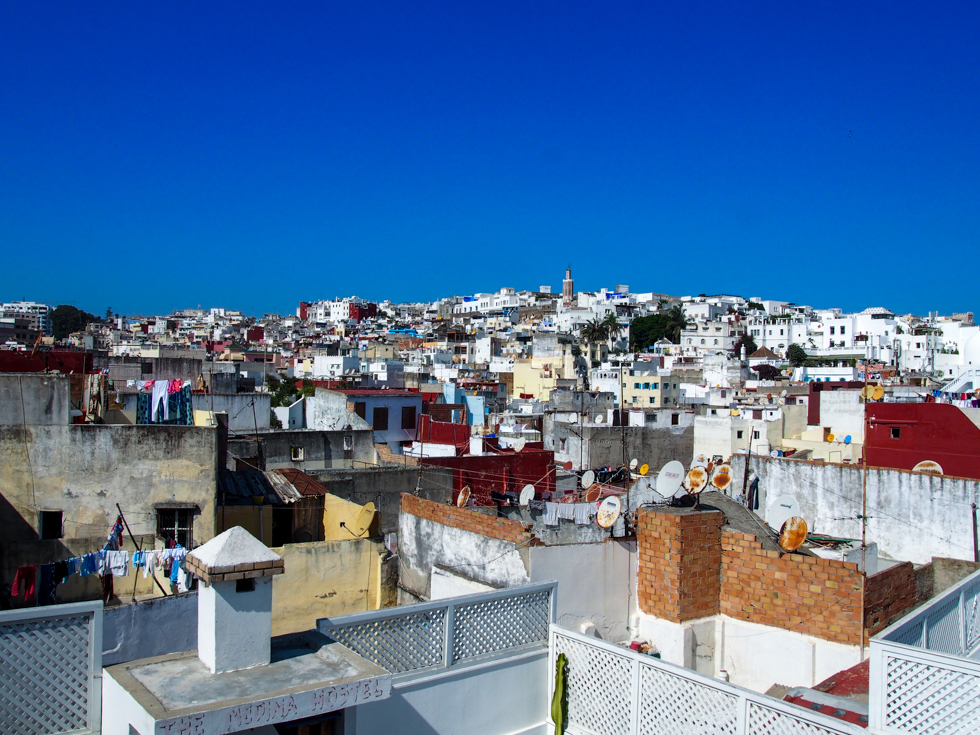
Beautiful view of Tangier’s medina as seen from a quintessential Moroccan terrace
“Hay un toilette fii el camión?” I found myself thinking. One sentence, three languages: Spanish, French, Arabic, and Spanish again. “Probably not,” was the follow-up thought. And there was English. This would be my experience in Tangier: existing entangled across languages.
Before going to Morocco I had been in Andalucía, Spain, slowly inching my way further south. First I went to Sevilla, then to Cádiz, and then to the southernmost tip of the country, Tarifa. In Tarifa, I first started to see the everyday melding of two cultures: couscous in the restaurants alongside Spanish tapas, the throaty inflection of Arabic spoken by people walking around the city. You can even see Morocco from the coast of Tarifa, a distant shadow of mountains coating a skyline not too far away.
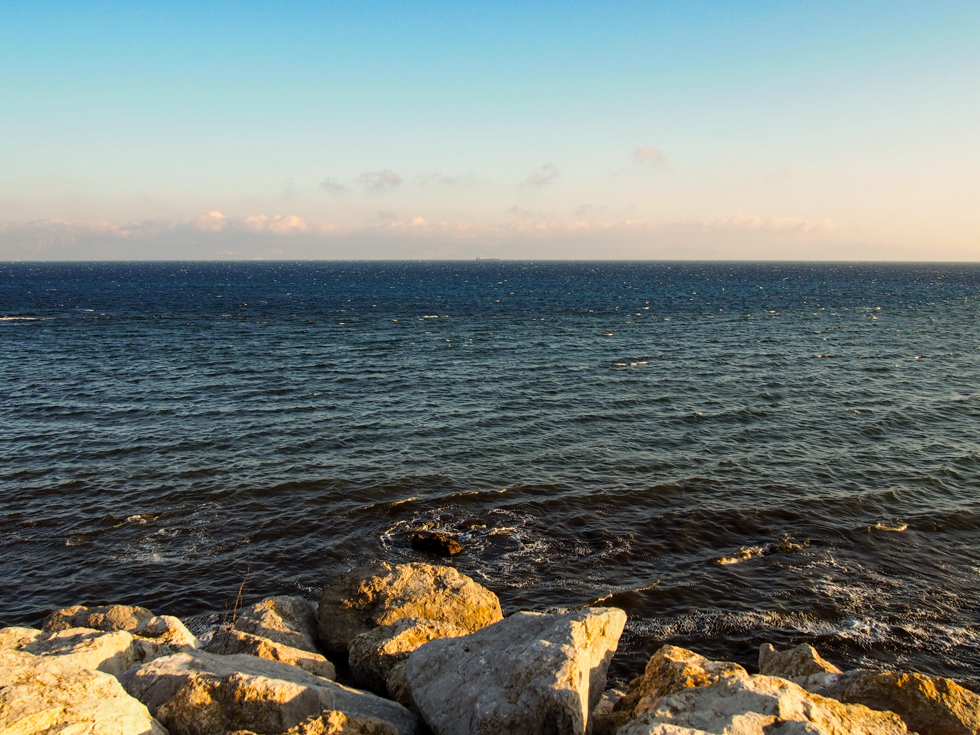
See those clouds hugging mountains along the horizon? That’s Morocco, seen from Tarifa, Spain!
Morocco is only 39 kilometers away from the southernmost tip of Spain, yet I was a little nervous about the journey across the Strait of Gibraltar. My main apprehension surrounding Morocco related to language, especially after being in Spain. You see, Spain is like my home away from home. I feel an effortlessness when speaking Spanish, and my familiarity with Spanish culture and way of life (especially after living in Sevilla in 2013) made each day there remarkably comfortable. But Morocco, I presumed, especially with my definite lack of command of Arabic, would not be nearly as comfortable. Which is okay! Travel doesn’t have to be comfortable. But knowledge of the local language changes an interaction with a country, and I believe this change is almost always universally positive.
Speaking of languages, Morocco is a country of linguists. Most Moroccans speak at least two languages, but many speak three, or four, or more. The official languages are Moroccan Arabic and Berber. French is also incredibly widespread. Many folks also speak some degree of English. In Tangier, due to its proximity and current and historical link to Spain, many people also speak Spanish. Thus, at least in Tangier, it would have been very possible to rely on Spanish to communicate. But I was excited about traveling to Morocco for the Arabic language immersion. And regardless, I believe in the importance of making an effort to speak the local language while traveling. So once I stepped off Spanish soil, I entered Arabic mode.
But, let’s be real. My Arabic is very elementary. After my stint in the Middle East back in 2015, I developed an intense interest in the language. I took a few classes and learned how to read and write, and conjugate verbs, and speak in simple sentences. But after a year or so of studying, I stopped going to classes, stopped reviewing vocabulary, and stopped listening to Arabic podcasts and doing all the other due diligence that allows one to become proficient in a language without traveling. So, naturally, I quickly lost a lot of vocabulary. Sure, I remembered structural components of the language, such as basic verb conjugation and sentence structure. But all of that knowledge was fairly useless without any basic vocabulary! In the days before arriving in Morocco I struggled to remember simple words and phrases like “I want”, “bus station”, and “bathroom.”
But I still tried, with the little that I did remember, to speak. Starting on the boat over, the languages around me a jumble of Arabic and Spanish and plenty more, I tried. I spent a few minutes chatting with a man from Rabat, who looked at me like I had three heads when I asked him how to say, “How do we say ___ in Arabic?” in Arabic. I realized a few days later that instead of asking him, “How do we say ___ in Arabic?”, I had asked him, “How do we talk ___ in Arabic?”. No wonder he was confused! But still, he kindly gave me some advice on places to go in Morocco, and also invited me to stay with him in Rabat. The generosity of folks abroad never ceases to amaze me. How often do people from the United States invite strangers to stay in our homes after a short conversation? I thanked him for the invitation with a شكرا . An hour later, once the mountains in the distance appeared crisp in their greens and browns, and the sprawl of Tangier unfolded before me, I stepped off the boat, ready to take full advantage of 10 days of Arabic language immersion in Morocco.
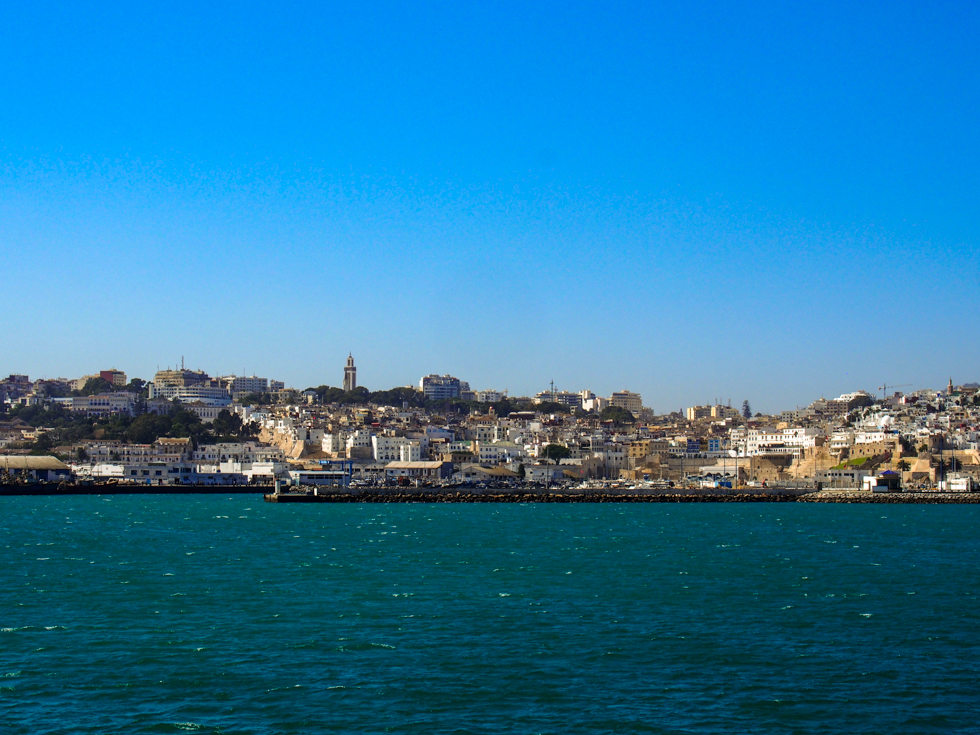
We’re so close to Tangier! View of the city as the boat approaches the port.
Mazes, medinas, and more in Tangier
I followed the signs reading “sortie” for the exit to the port. In general, throughout Morocco the signs are written in Arabic and French, as are many of the menus in restaurants. In spite of my much greater command of Arabic than French, I ended up reading a lot in French while in Morocco (and then translating to Spanish) to get by. The Arabic word for exit I would have to add to my list of vocabulary to study. I found the exit and stepped out of the port, moving past taxi drivers who beckoned me with hellos and holas and bonjours, on my way to the medina.
Medina (مدينة) is the Arabic word for city, though when we say “the medina” in the context of any Moroccan city, it generally refers specifically to the historic center of the city. In fact, many cities have both medinas and “new medinas”. The “new medinas” are generally just a few hundred years old, as opposed to the many hundreds of years of the (old) medinas. The old medina of Tangier is just a short walk from the port. I crossed a main street and ascended the hill of a narrow, cobbled street leading into the medina.
My default activity in Tangier was getting lost in the medina, which happened often. The medina is a winding labyrinth of streets, alleys, staircases, and dead ends. Sometimes I walked down a road only to find that, after a few twists and turns, it ended at the doorway to someone’s house. I spent a lot of time backtracking through deadends and circling through the maze of streets. The first afternoon that I spent in Tangier, I stumbled across an alleyway with a wall covered in Arabic script. I tried to find it again, twice. I failed to find it, both times.
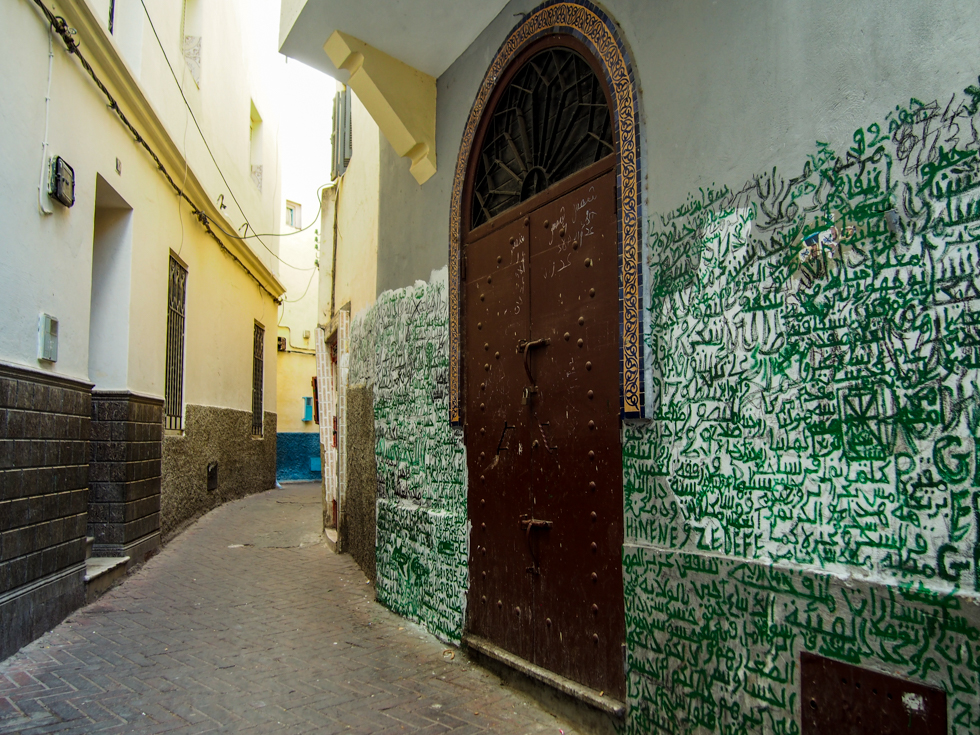
A medina alley wall covered in graffiti
There are signs throughout the medina, which were helpful because if not I would have spent lots of time each day trying to re-find my hostel. There are also many signs that point in the direction of the Kasbah, a palace and museum in Tangier’s medina, one of the main attractions in Tangier. I had managed to find the Kasbah by accident early in the day of my second afternoon, but somehow when I deliberately looked for it later in the day, I could not find my way to the Kasbah. After wandering down three dead ends, I asked for directions. The medina is not that large, but it is very much alive.
During the day, the medina is crowded with tourists, many of whom come from Spain for the day to shop, eat couscous, and drink mint tea. The medina houses a huge market, where you can find just about anything: tea sets and little glass cups, tagines of all sizes, prayer rugs, fruits and vegetables, freshly baked bread, Moroccan souvenirs, traditional clothing, home goods, boxes and boxes of dates, and more. Many shopkeepers called out to me as I walked around, with hellos and holas and bonjours, trying to get me to come into the shops to look at their hand-woven rugs or leather purses.
It was in Tangier that I first tried chicken tagine and avocado smoothies. It was in Tangier where I sat with a friend in a hookah bar, fruity smoke wafting through the room, while we talked about our dreams to change the world, the music alternating in the background from Arabic hip-hop to reggaetón. It was in Tangier that I felt the real vulnerability of trying and failing to express myself in another language. The words and letters I heard around me felt so familiar, yet when strung together they sounded like incomprehensible garble to my untrained ears. And I didn’t even remember how to say “I don’t understand” in response. But I learned it since! And I used it a lot. Like, multiple times per day or conversation a lot. Even an “I don’t understand” spoken in the local language is a good start, building blocks for everything yet to be understood.
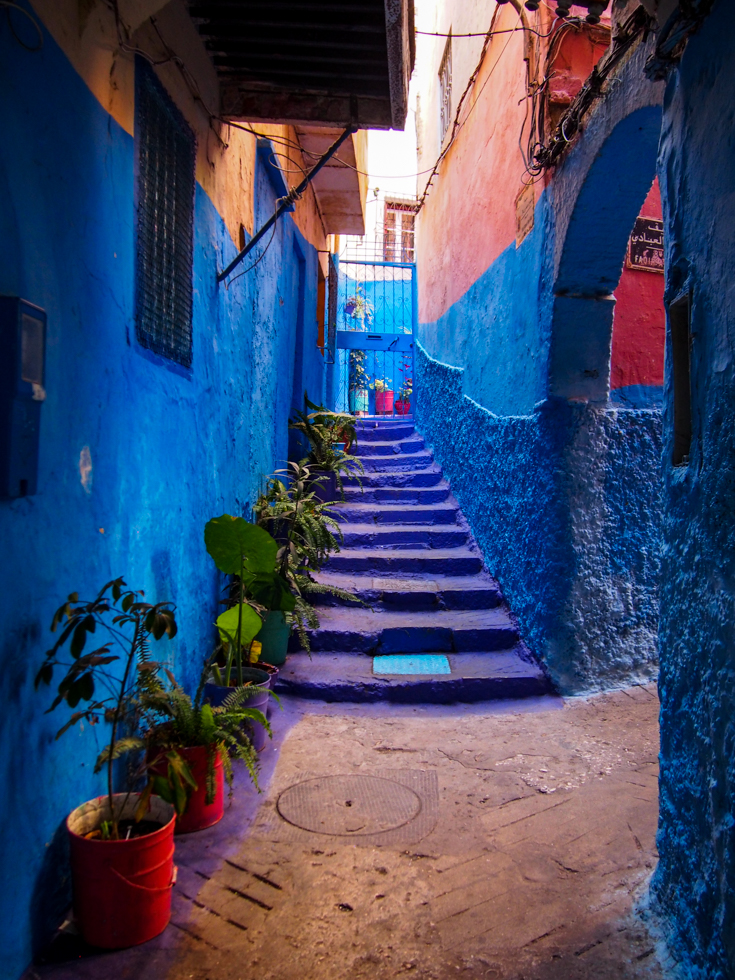
Beautiful corners of Tangier’s medina
Back to Arabic 101
Being in Tangier and being exposed to so much Arabic awakened a yearning within me, to learn. I started writing everything down, and asking lots of questions. How do you say this? What is that called? How do I write this in Arabic? And this eagerness, I think, was very touching to the people around me. It means a lot to make an effort to learn somebody else’s language. It is not necessarily kind, or fair, to assume that people want to speak any language but their own when they’re in their own homes. Even the bare minimum, like knowing how to ask for a big bottle of water at the corner store (!ماء كبير), goes a long way.
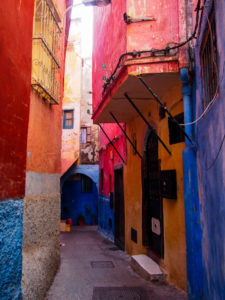
Beautiful, vibrant colors on medina walls
But of course, there’s still a lot to learn when you’re just learning the bare minimum. By my last morning in Tangier, I knew how to say a lot more than on my first morning. Now I could say things like, “I am going to buy bananas” or “Today I will go to Chefchaouen” or “I studied Arabic in the United States”. But I still didn’t know how to say bathroom! And so in the bus station, waiting for the bus to Chefchaouen, I speculated out loud to my travel buddies, friends I had made there in Tangier. “Do you think there’s a bathroom on the bus?” I asked them. We were going to ride the CTM bus, a couch bus, to Chefchaouen. I eyed the nearby buses. There was definitely room for a bathroom. If it were a bus in the United States, it would have a bathroom. But this was Morocco, and we were playing by Moroccan rules.
So I walked back inside the bus station, deciding that finding a bathroom now was a better bet than waiting to get on the bus and finding no bathroom, making for a very uncomfortable three hours to Chefchaouen. And while walking, I speculated on how to ask this question at all. “¿Hay un baño en el camión?” Man, I thought, Spanish was just so simple! Any word that I could ever need, I felt like I had at my disposal. If only I could have that kind of effortlessness in Arabic. But it was impossible, when I didn’t even know how to say bathroom. Or bus! “La toilette,” I thought bitterly. But it was the wrong language. “Hay un toilette fii el camión?” my brain managed to string together, grasping for words in any language at all at this point. What a mess! It messes with our hardwiring not to be able to express ourselves, especially when words are really all we have.
The next chance I got, I was going to figure out how to say bathroom. (بالعربية؟ bathroom كيف نقول)
Turns out, bathroom is حمام (pronounced like “hammam”), the man sitting across the aisle on the bus told me. Does the bus have a bathroom? (الحافلة عندها حمام؟) Little by little, poco a poco, شوية شوية.
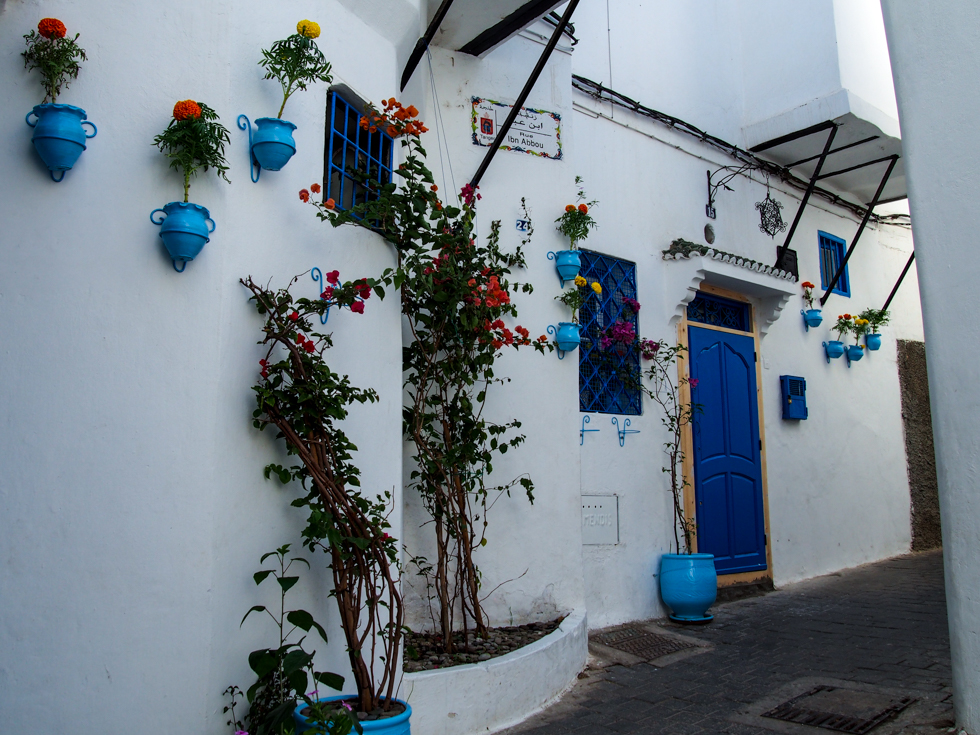
Wall of flower pots in Tangier’s medina
As for my Morocco travels, both in and beyond Tangier? Both Morocco and Tangier are freaking great. I kind of fell in love with Morocco. I love the food, the beautiful cities and landscapes, the friendliness and curiosity of the people, and the language. I love the throaty ع’s and the glottal stops and the ح’s pronounced like long, satisfied sighs. I love the twist of the script and the loopy calligraphy. I love the rhythm, the musicality, and the very intrinsic beauty of the language.
It’s true: العربية لغة حلوة. Arabic is a sweet language. And I have Tangier to thank for being my gateway to the language. If you ever have the chance to learn some Arabic, whether in Tangier or in Tokyo or in any other corner of the globe, I highly, highly recommend it.
For more insights on travel in Morocco, don’t miss my post on Chefchaouen, the famous blue city.
Have you ever been to Tangier? (Or anywhere else in Morocco?) What did you think about it, with respect to language or otherwise? Do you speak Arabic? How does speaking the language change your interaction with a place when you travel?
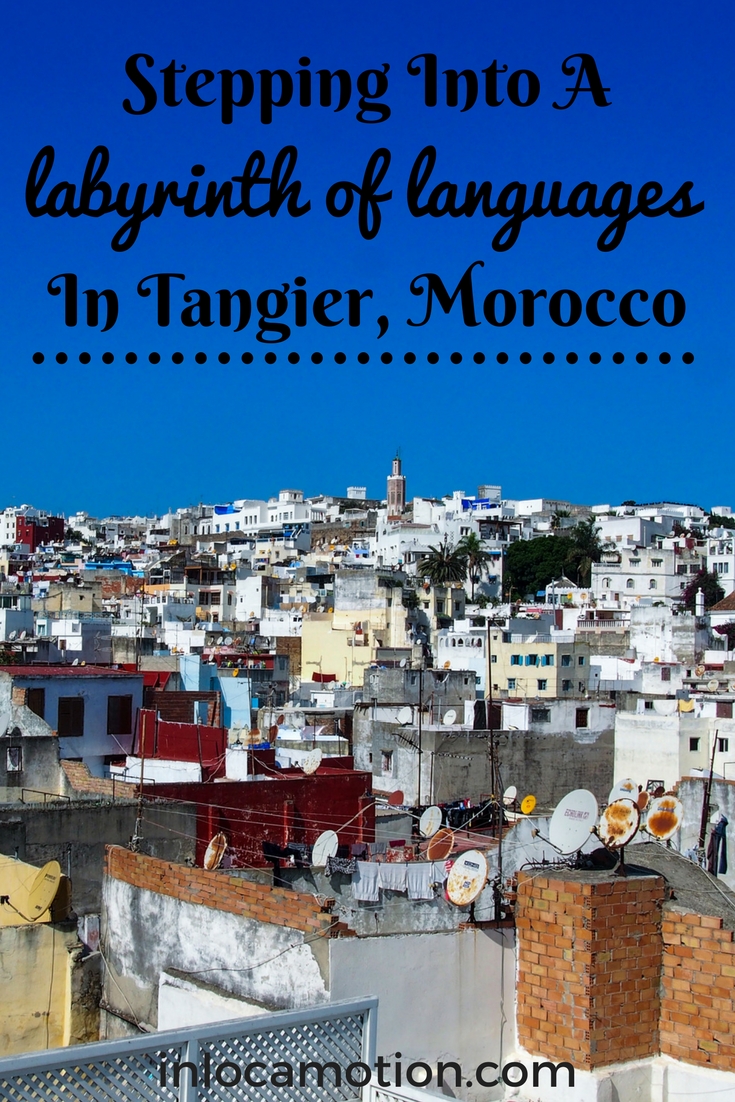









23 comments
Nice read. And loved the pics.i hv been reading about Morocco a lot off late and now really want to visit ☺
I’m glad you liked it! Yeah, I loved my time in Morocco and am really glad that I went 🙂 Thank you for reading and commenting, Madhu!
Loving this post. And some beautiful pictures! I have always wanted to go to Morocco, this post made me move it up the bucket list. Thanks for sharing.
I’m so glad you enjoyed the post! Thanks for reading and commenting 🙂 Where in Morocco would you like to visit?
This made me smile. My mother always told me the first thing to learn in a foreign language is how to ask about the bathroom because, and I quote, “everything else you can figure out later, but that one you need to know right away.”
I love languages, but something I’ve found is it’s REALLY hard for me to separate foreign ones in my brain. It’s like everything is English (my native language) and not-English (everything else). I studied Italian at university and now that I live in the Netherlands, I speak quite a bit of Dutch; and if I try to remember a sentence in Italian, it invariably turns into Dutch by the end.
Wise words from mama, I’ll keep them in mind next time! 😛
Yeah, I totally hear you about having trouble separating languages in your head. Language learning does some weird stuff to your brain, right? When I try speaking Arabic and there are words that I don’t know, they often come out in Spanish. I think the part of my brain that’s accustomed to being confused in foreign languages is used to thinking in Spanish! hahaha. So I mix the languages quite a bit. I think the best way to combat this is just to study a lot, especially if you’re learning multiple languages at once. Like anything, with practice it becomes much more familiar and comfortable, and it becomes easier to distinguish the languages in your brain.
Anyway, good luck with learning Dutch and whatever other language you embark on! Thank so much for reading and for your thoughtful comment, Emily!
Definetly relate to this one! I love learning languages while I’m travelling but sometimes it can be so difficult, to say even simple things. Beautiful pictures as well- adding Morrocco to my list.
Aw, thank you so much, Kate! Where have you traveled where you’ve experimented with language learning? I agree that it’s very challenging (especially because time is usually pretty limited) but language learning abroad is so so fun. Thanks for reading and commenting 🙂
Such an interesting read! I didn’t know there were so many languages spoken in Morocco. And yup, the first thing I learn to say is “where is the bathroom?” Lol. Beautiful photos as well!
Yeah, Morocco is a pretty awesome country with respect to languages. I was kind of in linguistic paradise there hahaha. Thank you for reading and commenting!! 🙂
I’m planning a trip to Marrakesh and honestly I have not thought about the language yet. I will learn some phrases before I go 🙂 The photos are beautiful, I love the blue.
That’s so exciting! I wanted to go to Marrakech but I didn’t have time. Next trip to Morocco! Good luck with language learning! Definitely a little bit of French and Arabic will be helpful. Thanks for reading and commenting, Nicola 🙂
Very well written! I have to say I am envious of your polyglot nature! I do speak Spanish and English, but I have to admit I wish I could speak 10 languages! I’m trying to force myself out of my comfort zone and into countries where I will need to step up! 🙂
You and me both! I’m only fluent in English and Spanish. At the moment my Arabic is kind of like the lowest level of conversational… but there’s definitely lots of work to be done. But yeah, forcing yourself out of your comfort zone with languages is really the best way to learn! What languages are you interested in learning, Kashlee?
Oooh I’d really like to visit Morocco! And I love Arabic. Learnt a bit a few years ago and would love to learn more.
Totally with you, both Morocco and Arabic are awesome! What made you learn Arabic a few years ago? Thanks for reading and commenting, Amy 🙂
I haven’t been to Tangier yet, but I hope to one day and I absolutely love your photos of this place! I had a similar experience in Marrakech with the myriad of languages and having to (unsuccessfully) learn basic french and arabic, when everything that comes out of my mouth is english and spanish, lol.
Thank you, Jin!! Yes, it can be so complicated to communicate in other languages, especially when you have such a strong grasp on English and Spanish – totally feel your pain! I hope that you enjoyed Marrakech and what I imagine is a similarly complex linguistic situation. Thank you for reading and commenting!
Wow! This must have been an awesome experience, Alissa! As a passionate lover of languages, this would probably be as complicated as learning a completely new language!
It was a great experience for sure! And yes, I think that language learning can be complicated at every stage – from absolute beginner to advanced. But it’s totally worth it! Thanks for reading and commenting, Agness 🙂
Wow! I love the colors, especially the narrow alleyways. It reminds me of Mdina, Malta, Tunisia all in one. I’ve always wanted to go there and hopefully we’ll make the time soon.
Yes, it really was quite an enchanting place. I hope you enjoy if you make it over there! Thanks for reading and commenting 🙂
So could you have solely gotten by on Spanish? I might head over soon and I’m curious